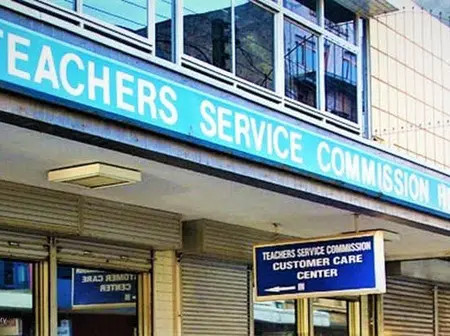The Teachers Service Commission (TSC) has given unemployed teachers across the country until Monday, September 9, 2025, to submit their applications for the recently announced 24,000 internship positions in junior schools.
TSC officially advertised the vacancies on August 24, 2025, and simultaneously activated its online recruitment portal, opening a two-week application window for eligible candidates.
According to TSC, the internships will run for one year on a contract basis and are aimed at bridging the acute shortage of teachers in Grades 7, 8, and 9 under the Competency-Based Curriculum (CBC).
The Commission emphasized that the program is not only meant to provide much-needed teaching staff to schools but also to give unemployed teachers an opportunity to gain classroom experience while supporting the education reforms currently underway in the country.
In its recruitment guidelines, TSC made it clear that the selection process will be guided by a scoring system that prioritizes teachers specializing in Science, Technology, Engineering, and Mathematics (STEM) subjects, followed by Technical subjects, and lastly Languages.
This criterion has sparked outrage among teachers trained in the arts, who feel sidelined by the Commission’s preference. Reports indicate that some art teachers are already mobilizing for protests to challenge what they term as “discriminatory recruitment practices.”
The Commission has, however, defended its position, pointing out the persistent and worsening shortage of science teachers across the country. TSC maintains that the prioritization of STEM educators is a strategic response to the crisis that has left many schools without adequate staffing in core science subjects.
The shortage of science teachers is not a new issue. During a past appearance before the National Assembly Committee on Education, former TSC Chief Executive Officer Dr. Nancy Macharia admitted that despite the country having over 400,000 unemployed teachers, very few applications are received for vacancies in science subjects such as Physics and Chemistry.
“What stands out is the problem of science teachers,” Dr. Macharia told the committee. “Based on our data, the majority of unemployed teachers are trained in the arts, while applications for science positions remain very low. This has left many junior secondary schools understaffed in critical subjects.”
She further emphasized that the Commission has, on several occasions, reached out to the Ministry of Education and school administrators about the crisis, but little progress has been made. “We have never shied away from acknowledging the crisis of teacher shortages. We have to recruit and redistribute teachers across counties, but when we advertise, we rarely receive applications for certain subjects, especially Physics,” she added.
The latest move by TSC is seen as a setback to thousands of teachers with Arts-based subject combinations, many of whom had hoped to secure internship opportunities this year. Similar frustrations were witnessed during the November 2024 recruitment drive, when the Commission advertised 20,000 internship slots for junior secondary schools. In that exercise, science and technical teachers were largely favored, leaving many art teachers without placements.
In some sub-counties, only science and technical subject teachers were considered, with the successful applicants reporting to their new schools in January 2025. This trend has heightened fears among art teachers that history may repeat itself in the ongoing recruitment.
As part of the recruitment process, applicants who make it past the shortlisting stage will be invited for a verification exercise at the sub-county level. During this stage, candidates will be expected to present several key documents, including:
Once the verification process is complete, successful candidates will be required to sign a one-year internship agreement with TSC before receiving their postings to schools. The new interns will then be deployed across the country to help strengthen the implementation of the Competency-Based Education (CBE) system.
The recruitment exercise highlights the difficult balancing act faced by TSC, on one hand, addressing the overwhelming demand for teaching jobs among unemployed teachers, and on the other, responding to the urgent need for subject-specific staffing in schools.
While the Commission’s focus on science and technical subjects is informed by national needs, it continues to leave a large pool of arts-trained teachers feeling excluded.
As the September 9 deadline approaches, all eyes will be on how TSC manages the recruitment process and whether the grievances raised by art teachers will influence any changes in policy. For now, unemployed teachers are being urged to take advantage of the application window and submit their documents through the Commission’s online portal before the deadline lapses.

Leave a Reply